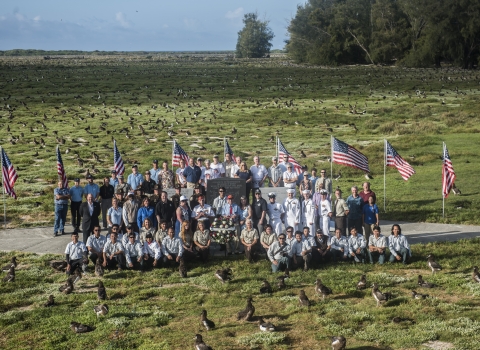In 2003, the Bouchard Buzzards Bay oil spill devastated nearly 100 miles of coastal Massachusetts and Rhode Island. An estimated 98,000 gallons of oil spilled into the bay – killing hundreds of shore birds, harming aquatic life, and restricting public and commercial beach access. Following the spill, the Natural Resource Damage Assessment and Restoration Program assessed the injuries and secured funding to restore the habitat and wildlife of the coastal community as well as public access to beaches.
Finally, in 2011, the Natural Resource Trustees including the U.S. Fish and Wildlife Service, National Oceanic and Atmospheric Administration, Commonwealth of Massachusetts, and the State of Rhode Island reached a settlement of $6 million with the Bouchard Transportation Company. Approximately $270,000 of this funding was used to construct a new universally accessible all-persons trail, remove invasive species invasive species
An invasive species is any plant or animal that has spread or been introduced into a new area where they are, or could, cause harm to the environment, economy, or human, animal, or plant health. Their unwelcome presence can destroy ecosystems and cost millions of dollars.
Learn more about invasive species , and plant native species, improving the marsh habitat for local wildlife.
Underneath the hot sun of mid-summer 2022, nearly 90 people gathered at Mass Audubon’s Allens Pond Wildlife Sanctuary in South Dartmouth, Massachusetts to celebrate the grand opening of the new all-persons trail. Spirits were high as collaborative partners took to the trail to experience the outdoors together. The event honored the work of partners, volunteers, and our staff to transform past tragedy into triumph.
During the grand opening event, USFWS Ecological Services Assistant Regional Director Sharon Marino spoke on behalf of the Natural Resource Trustees.
“Projects like this allow those of all abilities to experience and learn about coastal habitats,” said Marino. “By creating opportunities to experience the outdoors we help connect the public with their natural resources, inspiring the next generation of environmental stewards.”
One of those stewards is Jerry Berrier. As both a blind visitor and an assistive technology consultant with New England Low Vision and Blindness, Berrier has worked with Mass Audubon on a number of projects using his own experiences to help guide accessible design. With a passion for wildlife and an interest in birding by ear, Jerry has developed a long-standing relationship with the organization.
"This is one of my favorite things I've ever done," said Jerry on the completion of the project. "It's a way to find yourself. You have a bad day; you can come walk these trails."
The half mile wheelchair-accessible loop guides visitors through fields and marshlands before ending at a nearby vernal pool. It includes 13 interpretive signs outfitted with braille and wildlife sculptures, a sensory garden for a tactile experience with local wildlife, and an optional audio tour. In addition, a guiding rope lines the trail with coded beads to alert blind visitors of upcoming signs, stops, and sitting areas.
Trails like these are a reminder of the Service’s mission: to conserve and protect our natural resources for the present and future benefit of all Americans. Through NRDAR we have the potential to turn ruin into revelation. By expanding access, we meet people where they are and help them find their own individual ways to connect with wildlife. Now that’s something worth celebrating.





